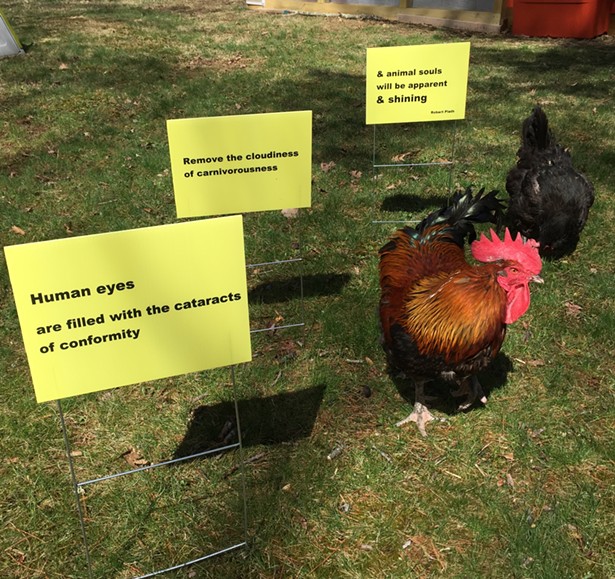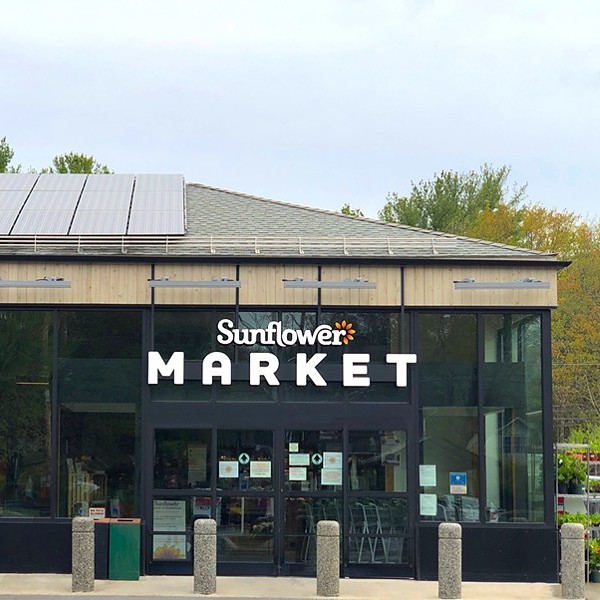As a kid growing up in Manhattan, Rebecca Moore had a special connection to animals. She felt empathy for the rats and squirrels that everyone around her regarded with revulsion. That empathy reached its peak in the summer of 1978, when Moore went away to summer camp.
“I was playing with this sweet little baby chick, and then was led to the dining room and served chicken,” she says. “I marched right home and told my parents I wasn’t eating animals anymore.”
Luckily, Moore’s parents were understanding. They were both artists, and Moore grew up entrenched in the avant-garde scene. She took part in performance art as a toddler, and as she grew older, she worked day jobs while performing in a band by night. But after a while, Moore knew her love for animals was calling her elsewhere. Elsewhere turned out to be the Hudson Valley.
When Moore started working for an animal sanctuary upstate, she expected just that: a sanctuary. She thought she would walk into a line of work centered around gentleness and compassion. But what she experienced was boot camp. She would go without food or sleep, constantly responding to emergency calls. “These rescues are huge, they’re doing really large-scale work,” she says. “Your mental and physical wellness are not part of that equation.” Moore noticed that the situation at the sanctuary wasn’t much better than where the animals had been rescued from. In one instance, a flock of 100 birds was rescued overnight, each one of them with a serious illness. Moore and her coworkers tried to keep up, but inevitably, the birds began dying.
“It’s traumatic if you love animals and you’re put in a situation where you can’t see to their needs,” Moore says. After hopping between sanctuaries for 10 years, Moore realized that the system was broken.
She noticed that chickens got the least care. “A lot of vets won’t even see chickens,” she says. “You have to go to an avian veterinarian.” These huge sanctuaries weren’t expending resources on specialized vet visits for their resident hens and roosters, so Moore began bringing chickens home one by one, from each rescue she worked at, starting with Nelly in 2008, a rooster born with deformed feet.
By 2013, Moore’s chicken saving operation had a name and a website: the Institute for Animal Happiness. Moore specifically avoided the overused word sanctuary when naming it, opting instead for a name with a touch of lightness. “Obviously, the Institute is about so much more than toxic, faux happiness,” she says. “We were just trying to create a space where there is that sense of humor in this very difficult work.” In 2019, the Institute officially became a nonprofit organization.
In starting the Institute, Moore recalled her past experiences and strove for the opposite. She chose to focus on rescuing chickens specifically and see to their needs. One rooster, Percy, even had a mini zipline made for him for physical therapy purposes. To ensure comfort, cofounder Brian Normoyle built insulated, roomy coops for residents. Moore wanted to stray away from the aesthetics of typical sanctuaries. Instead of white picket fences and quaint barns, she went back to her roots and took a modern approach. Coops are painted in bright, rich colors, and signs with poetry by Moore’s friends decorate the grass.
Vegan Activism
Since founding the Institute, Moore has branched out from rescuing chickens to broader animal activism. She started the annual Hudson Valley Vegfest in 2018 with her friend Sande Nosonowitz as a way to help pay for veterinary bills and increase awareness around veganism. For two years, the Vegfest allowed thousands of Hudson Valley residents to try plant-based foods and check out work by vegan artists. So many artists signed up to be a part of the Vegfest that it birthed a new venture: Kingston Animalia, a “vegan arts uprising.” Moore plans to both continue the Vegfest and hold Kingston Animalia’s first standalone event once it’s safer to do so.
Moore is also chipping away at the idea that veganism isn’t accessible by teaming up with New York Farm Animal Save and People’s Place for Happy Cart. This free food cart can be found at People’s Place food pantry in Kingston. In November, the three teamed up again for a Happy Harvest Dinner at People’s Place, providing free vegan food and supporting local businesses by sourcing ingredients from Hudson Valley residents like chef Drake Page and Little Garden of Eat’n founder Siobhan DuPont.
Looking for a New Home
For the past five years, the Institute has sat on a half acre of land that Moore and Normoyle rent from a friend. “Our landlord has been so wonderful to us,” Moore says. “Few people would let me start a chicken sanctuary.” But after COVID-19 hit, her landlord realized he would need the property back for his own use. Now, the Institute is looking for a new home. Preferably somewhere bigger, where they can add even more rescued chickens to their flock.
Before they have more land, the Institute won’t take more chickens. Currently, the Institute comfortably houses 13 residents. Moore refuses to let her organization fall into the same patterns as big sanctuaries: too many birds, too little space, and no specialized care. “Maybe somebody out there is sitting on 100 acres they aren’t using, and maybe they’ll give us 10 to buy from them,” Moore says. Whoever that landowner is, Moore, Normoyle, and their flock are counting on a like-minded person to turn up. After all, birds of a feather…




















